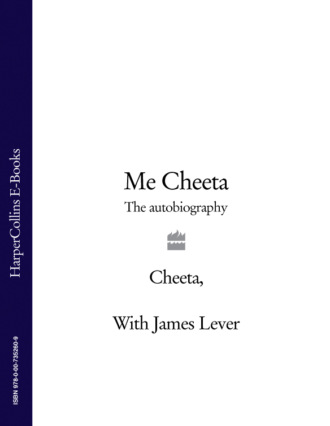
Полная версия
Me Cheeta: The Autobiography
I blundered through a maze into the lower canopy where I was hidden, and blundered on until I had to stop and rest in a little cradle of branches. After a while, there didn’t seem to be much reason to go anywhere: Mama was my only home, and she would find me if she could. So I didn’t move, except once to fetch some leaves when the cradle began to hurt. I breathed and slept and didn’t grow hungry, and let the rain fall on me as it fell on everything else.
What happened to us, dearest humans, was nothing special. I suppose Cary must have staged a coup against old Kirk, and then against his two other main rivals. But who cares? It was just politics. Sooner or later, every creature that lives in a forest has to learn that there’s only the hierarchy and alphadom and the constant dance of death. From the termites to the turacos to the marmosets and pythons, from the mongooses to the leopards and the apes, every one of us, every second of every day, was simply trying to pass on its death to another. Even the bushpigs at their mothers’ teats, stealing milk from their brothers and sisters, and the trees and the grasses, too. Everything that lived, murdered. We were meant to be the best of all creatures, the paragon of the animals, and we also were mired in it. I watched the turacos around me stab the caterpillars and kept thinking there had to be something—one thing—that wasn’t hostile to its bones. But everything was steeped in death: all creatures great and small.
I stayed in my tree for what seemed a long time; a day and a night, and a day, and a night, and a day. I heard the turacos’ chicks screaming for their caterpillars; I watched the many-coloured bird alight and fly off and wondered whether I might become a bird now that I meant never to go to ground again. I heard hooting and barking close by; I watched Cary make the leap from the foliage of the sloe tree next to me. I saw the way the branch gave as he landed and the way he eased through the ribs of the tree towards my cradle. And only when he was almost upon me did I realize I wasn’t reconciled to it: I didn’t want to die. To my surprise, I wanted to survive.
There was no chance that I could out-climb Cary, and I waited until my branch was quivering with his weight, then dropped back down into what I had once thought was my own little princedom. Then I was running again on watery legs, and I thought the worst that could happen was that I’d be chased off and could maybe find Mama or Victoria before the leopards got me. But I saw that closer to me than Cary, and even more frightening, was Stroheim. He was almost hopping with exultation at the way his world had suddenly become a whole lot simpler. Big dumb Stroheim, who later, by the way, went on to a nothing-much career in Hollywood. In fact, MGM used to loan him out to RKO, where he’d occasionally crop up in tenth-rate Bs, bullnecked, horse-faced and bald, staring into the camera with a kind of George Raft aura. If you just wanted an ape to sit there and not bump into the furniture, then he could do a job for you. He was no worse than a stuffed one, you could say that much: he breathed perfectly convincingly. Sorry, I digress. Where was I? Of course—about to be murdered by an extra. I felt Stroheim’s fingers missing my heels, and then catching them, and then, as we skated over a slippery slick of leaves, he was on top of me and then horribly around me and Cary was skidding into us as we both fell together. So it was in a ball of enemies—a sort of writhing bolus like you see snakes make—that I died and began to ascend to heaven.
I was shot up towards the canopy, towards the sky. I rose faster than you can fall. I understood that I would become a bird—it all made sense. A many-coloured bird was what you became when you died. And then we sagged to a halt and hung, the three of us, still tangled in our ball of hatred, denied entry to the next stage of life.
About a foot from my face I saw an ape, white-faced, complexly coated, smiling. This, I would later discover, was Mr Tony Gentry, whose funeral in Barstow, California, 1982, would be such a solemn affair that I ended up playing a few of my favourite atonal noodles (not yet available on CD, but there are plans) on the organ to cheer everyone up a bit.
‘Got three!’ shouted the ape. ‘Three of them, having a little play together!’
Humanity. Thank God for you.
We were lowered to the ground, separated, and gently ushered into wooden cubes. Kind hands urged us inside our chambers; gentle voices urged us to eat. I saw old friends in other chambers—my old playmates Frederick and Gerard. And others: the innocent and the guilty alike. I was pretty sure we were still alive, though it did seem equally likely that we were all dead and in another world. But I didn’t see Mama, or Victoria.
Two mind-bendingly peculiar days later, we were sitting in a monsoon in a town that Don’s pretty sure used to be called Kigoma, an old West African term that translates as ‘Salvation’.
Конец ознакомительного фрагмента.
Текст предоставлен ООО «ЛитРес».
Прочитайте эту книгу целиком, купив полную легальную версию на ЛитРес.
Безопасно оплатить книгу можно банковской картой Visa, MasterCard, Maestro, со счета мобильного телефона, с платежного терминала, в салоне МТС или Связной, через PayPal, WebMoney, Яндекс.Деньги, QIWI Кошелек, бонусными картами или другим удобным Вам способом.


